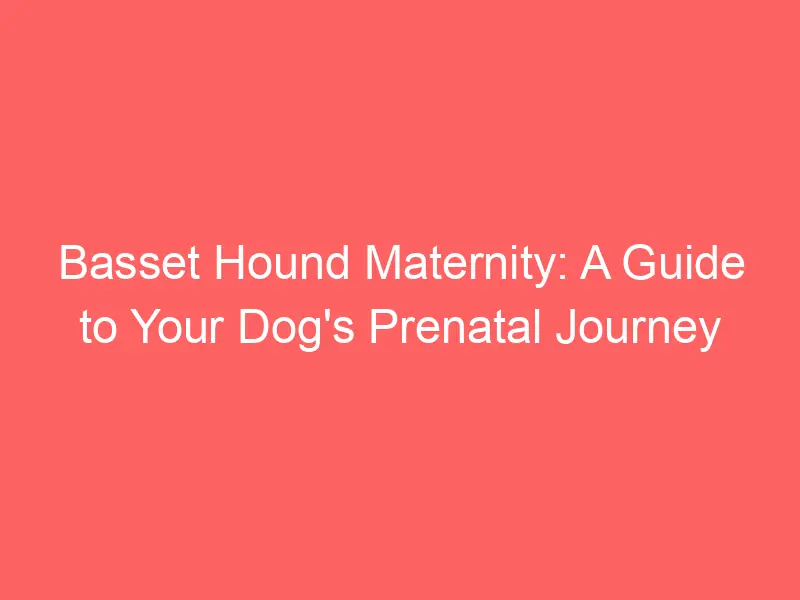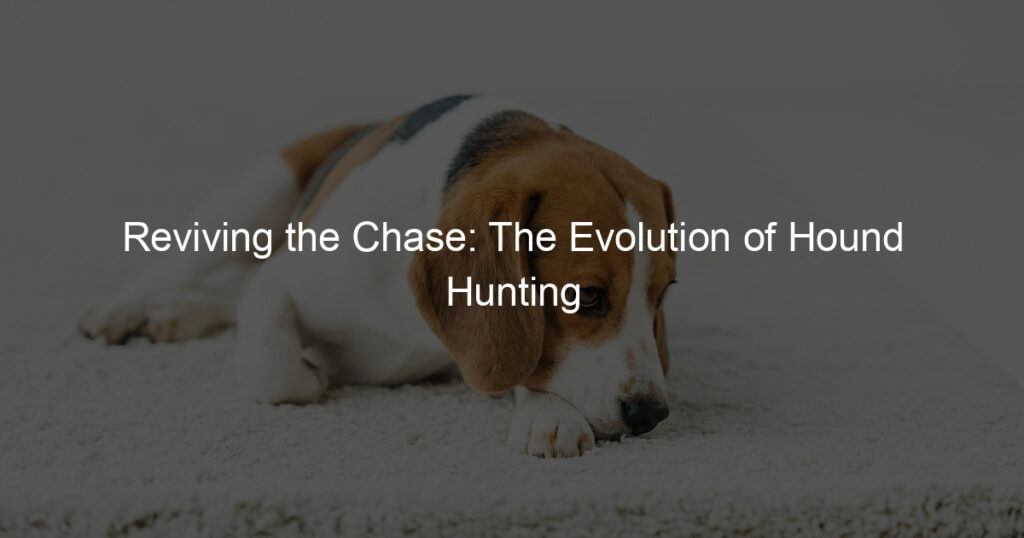
Introduction to Basset Hound Pregnancy
Welcoming a litter of Basset Hound puppies into the world is an exciting experience. However, it’s essential to understand the breed and the signs of pregnancy to ensure a healthy and safe delivery. In this section, we will delve into these topics.
- Understanding the Basset Hound breed
- Recognizing the signs of pregnancy in Basset Hounds
The Basset Hound is a short-legged breed of dog of the hound family. They are renowned for their keen sense of smell, second only to the Bloodhound. Bassets are friendly, outgoing, and excellent with children, making them a popular choice for families. They typically have litters of 6-8 puppies. Understanding the breed’s unique characteristics can help you better care for a pregnant Basset Hound.
Recognizing the signs of pregnancy early can help ensure the health of the mother and her puppies. Some common signs of pregnancy in Basset Hounds include increased appetite, weight gain, and changes in behavior such as increased affection or lethargy. Around the fourth week, her belly will start to round out. By the seventh week, you may be able to feel the puppies moving. If you notice these signs, it’s time to prepare for puppies!
Understanding your Basset Hound and recognizing the signs of pregnancy will help you provide the best care for your dog during this special time. In the following sections, we will discuss prenatal care, breeding, preparing for puppies, and pregnancy care to ensure you’re fully prepared for this exciting journey.
Prenatal Care for Basset Hounds
When it comes to the health and wellbeing of your Basset Hound, prenatal care is of utmost importance. This care includes a variety of steps and considerations, with the primary focus being on veterinary care.
Importance of Veterinary Care
Professional veterinary care plays a crucial role in ensuring a healthy pregnancy for your Basset Hound. It is essential for monitoring the health of both the mother and the puppies, and for preventing and addressing any potential complications.
- Regular Check-ups
- Importance of Vaccinations
Regular veterinary check-ups are a cornerstone of prenatal care. These check-ups allow the vet to monitor the progress of the pregnancy and ensure that the mother and puppies are healthy. The vet can also detect any potential issues early on, allowing for prompt treatment and prevention of further complications. According to the American Kennel Club, expecting dogs should have a check-up every 3-4 weeks.
Vaccinations are another vital aspect of prenatal care. They protect the mother from various diseases that could potentially harm her or the puppies. Vaccinations also provide the puppies with passive immunity, protecting them during their first few weeks of life. The American Veterinary Medical Association recommends that expecting dogs be up-to-date on all core vaccinations.
In conclusion, veterinary care, including regular check-ups and vaccinations, is a crucial part of prenatal care for Basset Hounds. By ensuring that your dog receives this care, you can help ensure a healthy pregnancy and a safe delivery for your beloved pet.
Nutrition and Diet
When it comes to prenatal care for Basset Hounds, nutrition and diet play a vital role. Ensuring your pregnant Basset Hound gets the right nutrients can significantly impact the health of the mother and the puppies. Let’s delve into the specifics.
- Feeding a Balanced Diet
- Supplements for Expecting Basset Hounds
Feeding your Basset Hound a balanced diet is crucial during pregnancy. The diet should be rich in proteins, carbohydrates, fats, vitamins, and minerals. Proteins help in the growth of fetal tissue, including the brain. They also aid in increasing the blood supply, allowing the pup to grow. Carbohydrates provide energy while fats are vital for hormone production.
Remember, the quantity of food should increase gradually as the pregnancy progresses. However, avoid overfeeding as it can lead to obesity, making the delivery process difficult. It’s always best to consult with your vet to create a tailored feeding plan.
Along with a balanced diet, your Basset Hound may need certain supplements during pregnancy. These include folic acid, which helps prevent birth defects, and calcium, which is crucial for bone development. Omega-3 fatty acids are also beneficial as they aid in the development of the puppies’ brains and eyes.
However, it’s important to note that supplements should only be given under the guidance of a vet. Over-supplementation can cause health problems. For instance, excessive calcium can lead to a difficult delivery.
In conclusion, a balanced diet and appropriate supplements are key to ensuring a healthy pregnancy for your Basset Hound. Always consult with a vet to determine the best feeding and supplementation plan for your pet.
Basset Hound Breeding
Breeding Basset Hounds is a task that requires careful planning and consideration. The process involves more than just pairing two dogs together. It’s about ensuring the health and well-being of the breed for future generations. Let’s delve into the crucial aspect of choosing the right mate for your Basset Hound.
Choosing the Right Mate
Choosing the right mate for your Basset Hound is a critical step in the breeding process. There are two primary factors to consider when selecting a mate: genetic compatibility and health considerations.
- Genetic Compatibility
- Health Considerations
Genetic compatibility is essential to ensure the health and longevity of the puppies. It’s important to avoid mating two dogs with similar genetic disorders to prevent these conditions from being passed on to the offspring. For example, Basset Hounds are prone to certain genetic conditions like hip dysplasia and glaucoma. It’s best to choose a mate that doesn’t carry these genetic traits.
Health considerations are equally important. Both the male and female Basset Hound should be in good health before breeding. This includes being up-to-date on vaccinations, free from parasites, and not showing signs of any infectious diseases. Regular vet check-ups are a must to ensure the health of both dogs.
In conclusion, breeding Basset Hounds is a responsibility that should not be taken lightly. By choosing a mate with good genetic compatibility and health, you can help ensure the well-being of the puppies and contribute positively to the breed.
Understanding the Breeding Process
When it comes to breeding Basset Hounds, understanding the process is crucial. This includes knowing the stages of the gestation period and what to expect during labor and delivery. Let’s delve into these topics.
- Stages of Basset Hound Gestation Period
The gestation period for a Basset Hound is typically around 63 days, similar to most dogs. This period can be broken down into three main stages:
| Stage | Duration | Description |
|---|---|---|
| First Stage | 0-21 days | In this stage, the fertilized eggs travel to the uterus and begin to develop. |
| Second Stage | 22-42 days | The embryos start to take shape and grow. This is when the mother dog may start to show signs of pregnancy. |
| Third Stage | 43-63 days | In the final stage, the puppies continue to grow and develop. The mother dog will need extra care and nutrition during this time. |
- What to Expect During Labor and Delivery
As the end of the gestation period approaches, your Basset Hound will begin to show signs of labor. These signs may include restlessness, panting, and nesting behavior. It’s important to provide a comfortable and quiet place for your dog to give birth.
During delivery, puppies usually come out every 30-60 minutes. If your dog is in labor for more than two hours without producing a puppy, it’s time to call the vet. After birth, the mother will clean the puppies and start to nurse them. It’s a beautiful process to witness, but be prepared to step in if any complications arise.
In conclusion, understanding the breeding process of Basset Hounds is essential for a successful and healthy pregnancy. By knowing what to expect, you can provide the best care for your dog and her puppies.
Preparing for Basset Hound Puppies
Bringing a Basset Hound puppy into your home is a joyous occasion, but it requires careful preparation. One of the most crucial steps is setting up a comfortable and safe whelping box for the mother and her puppies.
Setting Up a Whelping Box
A whelping box, also known as a nesting box, is a safe space where your Basset Hound will give birth and care for her puppies during their first few weeks of life. Here’s how to set one up:
- Choosing the right size and location
- Materials needed for a comfortable whelping box
A whelping box should be spacious enough for the mother to stretch out comfortably, but small enough to keep the puppies close to her. A box measuring 4 feet by 4 feet is usually sufficient for a Basset Hound. Choose a quiet, warm location in your home, away from drafts and noise.
The box should be made of sturdy, easy-to-clean materials like plastic or wood. Line the bottom with a non-slip surface such as a whelping pad or carpet remnant. Add soft blankets for comfort. You’ll also need a heat source like a heating pad or heat lamp to keep the puppies warm, as they cannot regulate their body temperature for the first few weeks.
Remember, the goal is to create a safe, comfortable space where your Basset Hound can care for her puppies. With the right preparation, you’ll be ready to welcome your new Basset Hound puppies into the world.
Postnatal Care
After the birth of your Basset Hound puppies, it’s crucial to provide them with the right care. This involves not only ensuring their immediate health and safety but also preparing them for a healthy and happy life. Let’s delve into the specifics.
- Caring for Newborn Basset Hound Puppies
Newborn Basset Hound puppies are delicate and require special attention. Here are some key points to remember:
| Aspect | Guidelines |
|---|---|
| Feeding | Puppies should nurse from their mother as soon as possible after birth. This provides them with essential nutrients and antibodies. |
| Temperature | Keep the puppies warm, as they cannot regulate their body temperature in the first few weeks. |
| Hygiene | Ensure the whelping box is clean to prevent infections. |
- When to Introduce Puppies to Solid Food
Transitioning Basset Hound puppies to solid food is a gradual process that should start when they are about 3 to 4 weeks old. Here’s how to do it:
- Start by offering them a mixture of puppy food and milk replacer. The consistency should be like a thick soup.
- Gradually reduce the amount of milk replacer over the next few weeks.
- By the time they are 7 to 8 weeks old, they should be eating dry puppy food.
Remember, every puppy is unique and may progress at a different pace. Always consult with a veterinarian if you have any concerns about your puppies’ health or development.
Basset Hound Pregnancy Care
When it comes to Basset Hound pregnancy care, it’s crucial to be aware of potential complications and know when to seek professional help. Let’s delve into these aspects.
Handling Pregnancy Complications
Pregnancy complications can occur in any breed, including Basset Hounds. It’s important to understand common issues and know when to consult a veterinarian.
- Common pregnancy issues in Basset Hounds
- Difficulty in labor: Basset Hounds have a relatively large head and narrow pelvis, which can lead to difficulties during labor.
- Gestational diabetes: This is a temporary form of diabetes that can occur during pregnancy, leading to high blood sugar levels.
- Pre-eclampsia: This is a condition that causes high blood pressure and can lead to serious complications if not treated promptly.
- When to seek veterinary help
- Excessive panting or difficulty breathing
- Loss of appetite or excessive thirst
- Unusual behavior or signs of discomfort
- Abnormal discharge or bleeding
Basset Hounds, like other breeds, can experience a variety of pregnancy-related issues. Some common ones include:
It’s crucial to seek veterinary help if you notice any unusual signs in your pregnant Basset Hound. These signs may include:
Remember, it’s always better to be safe than sorry. If you’re unsure about anything, don’t hesitate to contact your vet.
In conclusion, taking care of a pregnant Basset Hound can be a challenging but rewarding experience. By being aware of potential complications and knowing when to seek help, you can ensure a safe and healthy pregnancy for your beloved pet.
Post-Pregnancy Care for the Mother
After your Basset Hound has given birth, it’s crucial to provide her with the right care to ensure her quick recovery and to prevent any postpartum issues. Here, we will discuss two important aspects of post-pregnancy care for your Basset Hound.
- Helping your Basset Hound recover after giving birth
Just like humans, dogs also need time to recover after giving birth. It’s important to provide your Basset Hound with a quiet and comfortable space where she can rest and nurse her puppies. Make sure she has access to fresh water and is eating a balanced diet to regain her strength.
Remember, your Basset Hound has just gone through a physically demanding process. She may be tired and need more sleep than usual. Allow her to rest and avoid any strenuous activities for the first few weeks after giving birth.
- Monitoring for postpartum issues
Postpartum issues can occur in Basset Hounds, just like in any other breed. These can include infections, mastitis, and eclampsia, which is a life-threatening condition caused by low calcium levels.
Monitor your Basset Hound closely for any signs of these conditions. If she seems lethargic, refuses to eat, or shows signs of discomfort, it’s important to seek veterinary help immediately. Early detection and treatment can make a significant difference in her recovery.
In conclusion, post-pregnancy care for your Basset Hound involves providing her with a comfortable environment, ensuring she gets enough rest, and monitoring her for any postpartum issues. With the right care, your Basset Hound will be back to her normal self in no time, ready to take care of her new puppies.
Conclusion: A Rewarding Journey
As we come to the end of our discussion on Basset Hound pregnancy and care, it’s important to reflect on the journey. Raising Basset Hound puppies and caring for your Basset Hound family is a rewarding experience that brings joy and fulfillment.
- The joy of raising Basset Hound puppies
Raising Basset Hound puppies is an adventure filled with moments of joy and learning. From the moment they open their eyes to the world, to their first steps and barks, every milestone is a celebration. Their playful antics and loving nature will fill your home with laughter and happiness. They are not just pets, but become an integral part of your family, bringing a unique charm and warmth.
As they grow, you’ll witness their personalities bloom. Each Basset Hound puppy is unique, with its own quirks and habits. Watching them explore their surroundings, interact with each other, and learn new things is a joyous experience that is sure to warm your heart.
- Continued care for your Basset Hound family
As your Basset Hound puppies grow into adults, their care continues to be a priority. Regular vet check-ups, a balanced diet, and plenty of exercise are essential for their well-being. Training them with patience and consistency will ensure they grow into well-behaved and obedient dogs.
Remember, your Basset Hounds are not just pets, but members of your family. Their health and happiness should be a priority. With proper care and love, your Basset Hound family will thrive, providing you with years of companionship and unconditional love.
In conclusion, the journey of raising Basset Hound puppies and caring for your Basset Hound family is a rewarding one. It’s filled with moments of joy, learning, and love. It’s a journey that enriches your life and fills your home with warmth and happiness.








